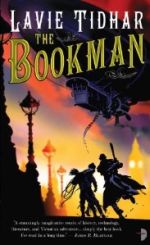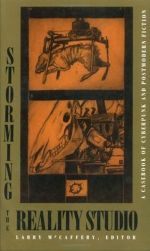Is SciFi good Kindling?
E-books and the future of science fiction
Flint also said of e-books, back in 2002, that “this new technology is a supply looking for a demand – and, so far at least, not finding much of one” (Prime Palaver #7). Eight years later, that demand seems to have been found: In Redstone’s first issue, author and editor Lou Anders said, “Obviously, ebooks are here. I think long-term we will see more of our casual reading shift to ebooks.…But more importantly, I think that the ebook will foster a resurgence of reading in general” (RSF#1). The number of e-readers one sees in coffee shops and airports is testimony enough. How might this rise in e-books wind up transforming society?
I suggest four possible ways: two pessimistic (like the panelists), and two optimistic. Let’s look at the dark side first. There are a couple of nightmare scenarios which e-books could conceivably bring about.
One is the loss of all of humanity’s valuable textual knowledge. This may seem odd, since in one sense, an e-book has a potentially infinite shelf-life compared to a physical book. E-books, after all, don’t succumb to cracked spines, water stains, bookworms, or acid in their nonexistent paper. It took legions of monks all busily copying away to maintain the existing corpus of decaying texts through the Middle Ages. But though e-books don’t succumb to such temporal attrition, they are affected by the passage of time in other ways.
This is because e-books can only be read with the right reader. Just as music formatting has changed over just a few decades from vinyl to 8-track to cassettes to CDs, and as in even less time movie formatting has changed from VHS to DVD to Blu-Ray, digital formatting is changing ever faster. Back when I was learning to program I used punch-cards (yes, I’m that old), then moved to magnetic tape, 8½” floppies, 3¼” floppies (which weren’t really floppy anymore), CD-ROMs, DVD-ROMs, and now flashdrives. Most of my writings from twenty years ago are now forever trapped in the magnetic void of old floppy disks because new computers aren’t made with drives for them. And what’s worse, corporations with their sights set on digital rights management have developed different encodings and encryptions, which require having the appropriate reader, and that it be registered with the correct passkey which is verified wirelessly, so that a Kindle-friendly book might not be readable on a Nook, and vice-versa. A few years after the format wars have been won by one corporation or another, texts encoded in the competing formats will become obsolete and inaccessible. (Have you tried watching a movie on Betamax lately?)
If we are not careful, a move to e-books may thus result in us slowly (or even quickly) losing our collective recorded knowledge base. Not because it actually disappears, but because we will forget how to access it. (Maybe James T. Kirk had a good reason for wanting a real, old-fashioned bound book in his hands; in some ways, physical books are more lasting.) What we may need to prevent this catastrophe is for the world’s monks to sing a Canticle for Leibowitz and start reformatting all of our old texts from dying media into multiple new modes, or we may risk losing our entire historical record – erased not by a nuclear Armageddon or by a rogue electromagnetic pulse, but by our obsessive quest for change which often masquerades as progress.
Another possible dystopian future may creep upon us even more subtly. At least two studies suggest that we remember and understand less of what we read on screen than of what we read in physical print:
Researchers at Ohio State University reported on a study … indicating that even for college students who are making an effort to absorb as much as possible, material read on a screen is harder to understand than the same material read on paper. … Forrester Research released a report showing that dropout rates for online courses can be as high as 80 percent. Why? In part, the Internet-research company found, because retention is 30 percent lower for material read online than for material read in print. (Jensen)
























5 comments
[…] Is SciFi Good Kindling? by Henry […]
This is a weird thing which seems to affect a lot of sci-fi writers (in my experience, anyway), both in their view of the future of publishing, and also in their adoption of new technologies. As a sci-fi fan and aspiring writer, I can’t imagine not adopting the newest, coolest gadgets as they come out — I get to live the stuff I read about growing up!
[…] This post was mentioned on Twitter by Mr Spock. Mr Spock said: Is SciFi good Kindling?E-books and the future of science fiction … http://bit.ly/agxnlg […]
Henry,
I appreciate the nod in your essay, but I have to jump in and correct a possible misinterpretation of the information. I use my Kindle both for e-books and Audible files. Sadly, the fear of the new publishing paradigms made possible by e-readers has over-ridden the goodness that would be more universally accessible reading for people whose bodies function in ways that limit their ability to read directly from a text object. (This is not just an issue for the visually impaired; many people with mobility and motor function issues also find books problematic.) When Amazon introduced the text-to-speech function, the writing community was disquieted. This essay by Roy Blount, Jr. is probably the most erudite version of the argument against this feature: http://www.nytimes.com/2009/02/25/opinion/25blount.html
Now, as a writer, I do care about rights and about the already paltry revenues that most writers see from their efforts. That said, I care more about accessibility. Amazon has seriously crippled the function, allowing publishers to “opt out” (which most have done) and seriously limiting the liberatory potential of the Kindle for persons with disabilities.
I have played with Kindle’s text-to-speech tool, and frankly, though it’s cool, it doesn’t strike me as a serious threat to the audio-book market. The voice can’t inflect, it can’t provide subtle clues to character shifts in dialog, and it rise and fall in tempo and pitch along with plot points.
It’s my sad belief that, in this case, the Author’s Guild came out on the wrong side of an issue that matters deeply to persons with a variety of disabilities. I hope that it’s a short-lived mistake, and that we see text-to-speech capabilities built into all e-readers in the near future.
Sarah
[…] or with their wonderful essay on eReaders at “Is SciFi good Kindling?” by Henry Cribbs […]